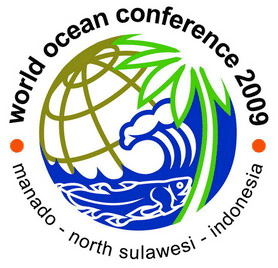 By Dian Kuswandini , The Jakarta Post , Jakarta | Thu, 07/31/2008 10:24 AM | National
By Dian Kuswandini , The Jakarta Post , Jakarta | Thu, 07/31/2008 10:24 AM | National The first world conference in Manado next year will address the impact of climate change on oceans and the degradation of marine resources, an official says.
"All this time, discussions and focus on climate change have been dominated by issues such as forests and alternative energy," secretary for the office of the coordinating minister for people's welfare, Dwisuryo Indroyono Soesilo, said here Tuesday.
"In fact, oceans have a significant correlation with climate change as they cover two-thirds of the earth's surface."
He said of the 300 or so topics discussed during the 2007 United Nations Framework Convention on Climate Change in Bali, only one topic was related to oceans.
"As a maritime country and the biggest archipelago on earth, Indonesia decided to initiate an effort to get the world's attention and commitment toward oceans by inviting multiple local and international stakeholders to the World Ocean Conference," he said.
The conference will take place in the North Sulawesi capital next May. The event, supported by the United Nations, will gather some 10,000 delegates from all over the world, including state leaders, ministers, scientists, entrepreneurs and activists.
Senior advisor to the maritime affairs and fisheries minister Gellwynn Jusuf said international citizens must be made aware of the issue of the oceans as the world's next frontier and their close connection to climate change.
Scientific research gathered by the ministry shows that oceans are the world's "mega carbon sink" and have been proved to effectively absorb gas emissions at a much greater rate than forests do.
The world's total ocean surface absorbs about 90 billion tons of carbon per year and releases 92 billion tons of carbon into the atmosphere each year.
Oceans are also capable of storing 50 times more carbon than the atmosphere. The oceans' role in regulating climate change also involves the mangrove ecosystems that protect shorelines and minimize the threat of coastal erosion.
The waters surrounding Indonesia, the Philippines, Malaysia, Papua New Guinea, Timor Leste and the Solomon Islands are known as the "Amazon of the Seas". Covering 75,000 square kilometers, the area contains 500 species of corals and is inhabited by more than 3,000 species. The area provides regional income of an estimated total of US$2.3 billion per year.
Research has also found the impacts of climate change on the condition of marine and coastal ecosystems range from rising sea levels to underwater tectonic activities.
"According to research, Indonesia could lose as many as 2003 islands by 2030 if no serious efforts to tackle climate change are made," Gellwynn said.
"It's clear now why we should send these messages to the world," Indroyono said, adding the conference would also seek recommendations for adaptation and mitigation.
"The outcome of this conference will include an international commitment articulated in the Manado Ocean Declaration."





No comments:
Post a Comment